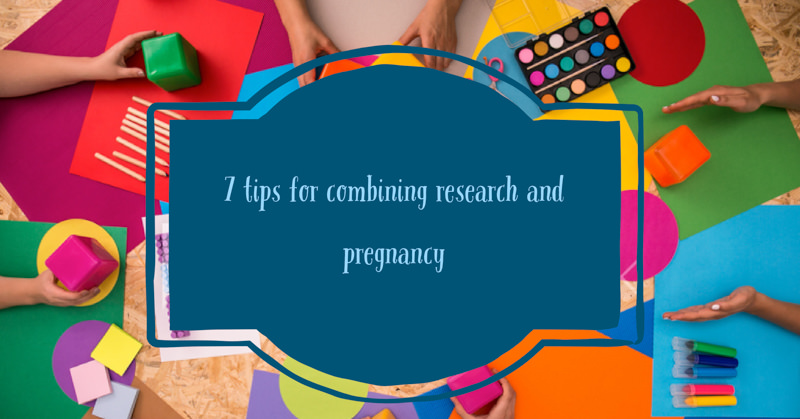The Career Series: 7 Tips When you are Expecting a Baby During your Ph.D. or During your Academic Career

You’re expecting a baby during your Ph.D. or during your academic career – congratulations! As parent-to-be, you will go through cycles of delight (OMG! I am going to be a mom! I’m so excited to meet this new human!) and cycles of worry (Am I suitable for this? How am I going to do this? How is this going to affect my career?).
As a new mom, I recall the worries I went through during my pregnancy. I am a tenured professor in Ecuador, and worried about who would teach my class during my maternity leave. I also work as a researcher in the Netherlands, and since the end of my pregnancy coincided with my annual research stay, I was afraid I would not be able to get much research done without being in the lab or in the field. If you are worried about how your pregnancy may affect your research, here are my seven best tips:
1. Tell your colleagues
Let your supervisors know about your situation. I was worried that my colleagues in Ecuador would have a bad impression because I got tenure and immediately “leaned back and had a baby”. In fact, they were happy for me and never gave a bad remark. I worried about being “useless” during my annual research stay in the Netherlands. Instead, my supervisors there made sure I could do interesting desk research, and they were very happy as well with the news.
2. Plan
If you are a researcher, you will need to think about the implications of your pregnancy in practical terms. You don’t wont to attempt doing fieldwork or lift heavy things or work with chemicals in the lab when you are walking around like a penguin and drop everything from your hands. You don’t want to have any big deadline a few weeks after your baby will be born. Depending on the airline, you won’t be allowed to fly after 35 weeks of pregnancy, so you won’t be able to attend certain conferences. Check your planning, adjust your commitments, and prepare for what lies ahead.
3. Delegate
If you really need experimental data to be gathered towards the end of your pregnancy, enlist help. Ask colleagues to give you a hand, or delegate tasks to a student you are supervising. Don’t try to be too stubborn in trying to do everything yourself with the intensity you are used to. Instead, use your situation to work differently, in a way that respects your pregnant body.
4. Rest
Talking about respecting your pregnant body: rest when you need it. Towards the end of my pregnancy, I felt almost bad about working “only” 8 hours a day during my research stay in the Netherlands (where I try to get as much work done as I can). I ended up sleeping between half an hour and an hour upon arriving home, because that’s what I needed at that time. Put the health of your baby and yourself first, and rest when you are tired.
5. Don’t skip your medical checks
It may feel like a nuisance to leave your work and go sit in the waiting area of a doctor’s office, but never cut corners on your medical checks. Follow the recommendations of your doctor in terms of sleep, exercise, medical exams, nutrition, and self-care. Pregnancy is a temporary stage, and if you neglect taking care of yourself during this time, you and your child will never get a second chance for taking better care of yourself.
6. Prepare for life with a baby
Figure out how you will organize yourself with a baby. Disclaimer: nothing can prepare you for becoming a parent, and all your good intentions and plans may go through the window once your child arrives. However, try to figure out the basics: How much maternity leave will (or can) you take? Once you return to work, how will you organize childcare?
7. Enjoy this special time
Pregnancy is an incredibly special time in your life. Enjoy it, and be present. If possible, join prenatal classes to meet other women that go through this special time. Write a diary about your pregnancy to share with your child later. Allow yourself to slow down, prepare yourself for giving birth, and make space in your life for your new family member.
Are you working as a researcher and expecting a child, or a parent? How did you feel during pregnancy? Share your experiences in the comments below!
 Dr. Eva Lantsoght (@evalantsoght) is a Full Professor in Civil Engineering at Universidad San Francisco de Quito, Ecuador and a part-time researcher at the Concrete Structures research group of Delft University of Technology. She blogs at PhD Talk about her research and general academic topics.
Dr. Eva Lantsoght (@evalantsoght) is a Full Professor in Civil Engineering at Universidad San Francisco de Quito, Ecuador and a part-time researcher at the Concrete Structures research group of Delft University of Technology. She blogs at PhD Talk about her research and general academic topics.
